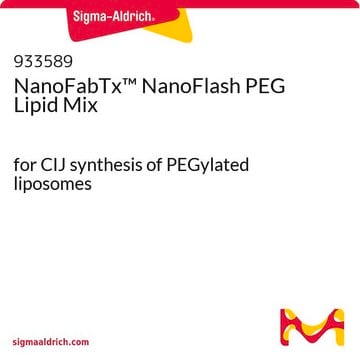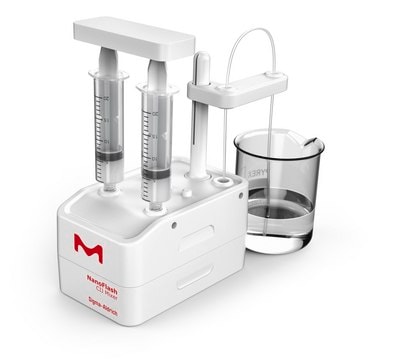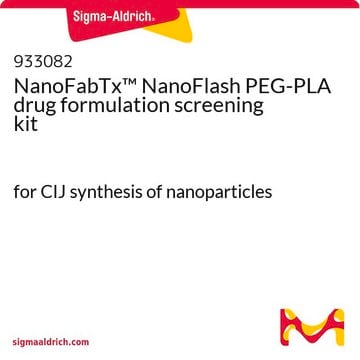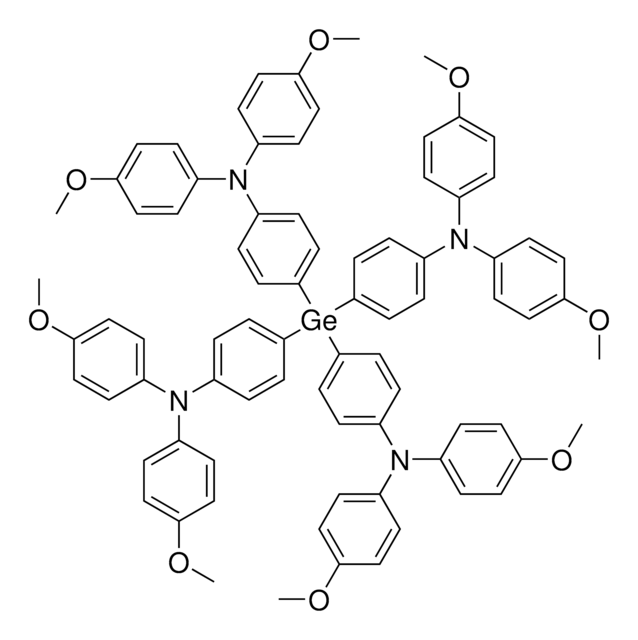933090
NanoFabTx™ NanoFlash PEG-PCL drug formulation screening kit
for CIJ synthesis of nanoparticles
Iniciar sesiónpara Ver la Fijación de precios por contrato y de la organización
About This Item
UNSPSC Code:
12162002
NACRES:
NA.21
Productos recomendados
storage temp.
2-8°C
Application
NanoFabTx™ NanoFlash PEG-PCL drug formulation screening kit is a ready to use nanoformulation kit for flash nanoprecipitation synthesis of PEGylated poly(caprolactone) (PCL) nanoparticles for drug delivery research applications. This kit contains rationally selected PEGylated PCL polymers and stabilizer, enabling users to screen and select nanoformulations without the need for lenghty trial and error optimization. These PEGylated PCL polymers have been widely used in drug delivery systems for controlled drug release of many different types of therapeutic molecules.
This kit has been curated and designed for flash nanoprecipitiaton (FNP) nanoparticle synthesis using a confined impingement jet (CIJ) mixer, such as the NanoFabTx™ NanoFlash CIJ Mixer, and detailed step-by-step instructions are provided.
This kit has been curated and designed for flash nanoprecipitiaton (FNP) nanoparticle synthesis using a confined impingement jet (CIJ) mixer, such as the NanoFabTx™ NanoFlash CIJ Mixer, and detailed step-by-step instructions are provided.
Features and Benefits
- Ready-to-use nanoformulation kit for PEGylated nanoparticles
- Step-by-step flash nanoprecipitation protocol
- Create specifically sized, biodegradable, PEGylated PCL nanoparticles
- Maximize the encapsulation of hydrophobic drugs
- Three different PEGylated PCL polymers are included
- Optimized for 60 nm-150 nm nanoparticles
Legal Information
NANOFABTX is a trademark of Sigma-Aldrich Co. LLC
Storage Class
11 - Combustible Solids
wgk_germany
WGK 3
flash_point_f
Not applicable
flash_point_c
Not applicable
Certificados de análisis (COA)
Busque Certificados de análisis (COA) introduciendo el número de lote del producto. Los números de lote se encuentran en la etiqueta del producto después de las palabras «Lot» o «Batch»
¿Ya tiene este producto?
Encuentre la documentación para los productos que ha comprado recientemente en la Biblioteca de documentos.
Jing Han et al.
Journal of pharmaceutical sciences, 101(10), 4018-4023 (2012-07-11)
Johnson and Prud'homme (2003. AICHE J 49:2264-2282) introduced the confined impingement jets (CIJ) mixer to prepare nanoparticles loaded with hydrophobic compounds (e.g., drugs, inks, fragrances, or pheromones) via flash nanoprecipitation (FNP). We have modified the original CIJ design to allow
Robert F Pagels et al.
Journal of controlled release : official journal of the Controlled Release Society, 219, 519-535 (2015-09-12)
Biologically derived therapeutics, or biologics, are the most rapidly growing segment of the pharmaceutical marketplace. However, there are still unmet needs in improving the delivery of biologics. Injectable polymeric nanoparticles and microparticles capable of releasing proteins and peptides over time
C Thomasin et al.
Journal of pharmaceutical sciences, 87(3), 269-275 (1998-04-02)
Phase separation (frequently called coacervation) of poly(lactide) (PLA) and poly(lactide-co-glycolide) (PLGA) is a classical method for drug microencapsulation. Here, attempts have been made to describe this process in the light of thermodynamics. Different PLA/PLGAs were dissolved in either dichloromethane or
K S Soppimath et al.
Journal of controlled release : official journal of the Controlled Release Society, 70(1-2), 1-20 (2001-02-13)
This review presents the most outstanding contributions in the field of biodegradable polymeric nanoparticles used as drug delivery systems. Methods of preparation, drug loading and drug release are covered. The most important findings on surface modification methods as well as
Verónica Lassalle et al.
Macromolecular bioscience, 7(6), 767-783 (2007-06-02)
The controlled release of medicaments remains the most convenient way of drug delivery. Therefore, a wide variety of reports can be found in the open literature dealing with drug delivery systems. In particular, the use of nano- and microparticles devices
Nuestro equipo de científicos tiene experiencia en todas las áreas de investigación: Ciencias de la vida, Ciencia de los materiales, Síntesis química, Cromatografía, Analítica y muchas otras.
Póngase en contacto con el Servicio técnico








